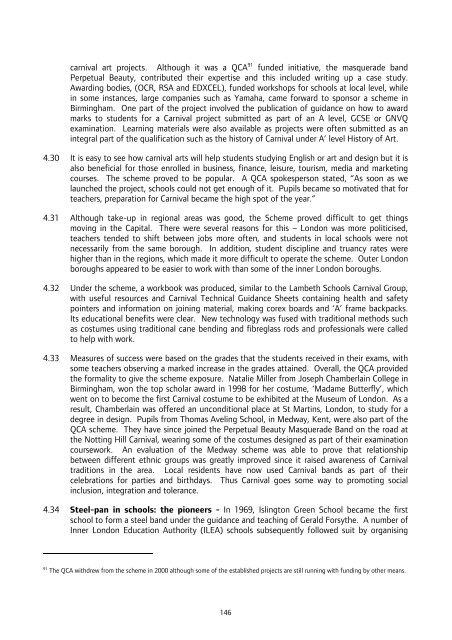Notting Hill Carnival Strategic Review - Intelligent Space
Notting Hill Carnival Strategic Review - Intelligent Space
Notting Hill Carnival Strategic Review - Intelligent Space
You also want an ePaper? Increase the reach of your titles
YUMPU automatically turns print PDFs into web optimized ePapers that Google loves.
carnival art projects. Although it was a QCA 91 funded initiative, the masquerade band<br />
Perpetual Beauty, contributed their expertise and this included writing up a case study.<br />
Awarding bodies, (OCR, RSA and EDXCEL), funded workshops for schools at local level, while<br />
in some instances, large companies such as Yamaha, came forward to sponsor a scheme in<br />
Birmingham. One part of the project involved the publication of guidance on how to award<br />
marks to students for a <strong>Carnival</strong> project submitted as part of an A level, GCSE or GNVQ<br />
examination. Learning materials were also available as projects were often submitted as an<br />
integral part of the qualification such as the history of <strong>Carnival</strong> under A’ level History of Art.<br />
4.30 It is easy to see how carnival arts will help students studying English or art and design but it is<br />
also beneficial for those enrolled in business, finance, leisure, tourism, media and marketing<br />
courses. The scheme proved to be popular. A QCA spokesperson stated, “As soon as we<br />
launched the project, schools could not get enough of it. Pupils became so motivated that for<br />
teachers, preparation for <strong>Carnival</strong> became the high spot of the year.”<br />
4.31 Although take-up in regional areas was good, the Scheme proved difficult to get things<br />
moving in the Capital. There were several reasons for this – London was more politicised,<br />
teachers tended to shift between jobs more often, and students in local schools were not<br />
necessarily from the same borough. In addition, student discipline and truancy rates were<br />
higher than in the regions, which made it more difficult to operate the scheme. Outer London<br />
boroughs appeared to be easier to work with than some of the inner London boroughs.<br />
4.32 Under the scheme, a workbook was produced, similar to the Lambeth Schools <strong>Carnival</strong> Group,<br />
with useful resources and <strong>Carnival</strong> Technical Guidance Sheets containing health and safety<br />
pointers and information on joining material, making corex boards and ‘A’ frame backpacks.<br />
Its educational benefits were clear. New technology was fused with traditional methods such<br />
as costumes using traditional cane bending and fibreglass rods and professionals were called<br />
to help with work.<br />
4.33 Measures of success were based on the grades that the students received in their exams, with<br />
some teachers observing a marked increase in the grades attained. Overall, the QCA provided<br />
the formality to give the scheme exposure. Natalie Miller from Joseph Chamberlain College in<br />
Birmingham, won the top scholar award in 1998 for her costume, ‘Madame Butterfly’, which<br />
went on to become the first <strong>Carnival</strong> costume to be exhibited at the Museum of London. As a<br />
result, Chamberlain was offered an unconditional place at St Martins, London, to study for a<br />
degree in design. Pupils from Thomas Aveling School, in Medway, Kent, were also part of the<br />
QCA scheme. They have since joined the Perpetual Beauty Masquerade Band on the road at<br />
the <strong>Notting</strong> <strong>Hill</strong> <strong>Carnival</strong>, wearing some of the costumes designed as part of their examination<br />
coursework. An evaluation of the Medway scheme was able to prove that relationship<br />
between different ethnic groups was greatly improved since it raised awareness of <strong>Carnival</strong><br />
traditions in the area. Local residents have now used <strong>Carnival</strong> bands as part of their<br />
celebrations for parties and birthdays. Thus <strong>Carnival</strong> goes some way to promoting social<br />
inclusion, integration and tolerance.<br />
4.34 Steel-pan in schools: the pioneers - In 1969, Islington Green School became the first<br />
school to form a steel band under the guidance and teaching of Gerald Forsythe. A number of<br />
Inner London Education Authority (ILEA) schools subsequently followed suit by organising<br />
91<br />
The QCA withdrew from the scheme in 2000 although some of the established projects are still running with funding by other means.<br />
146








